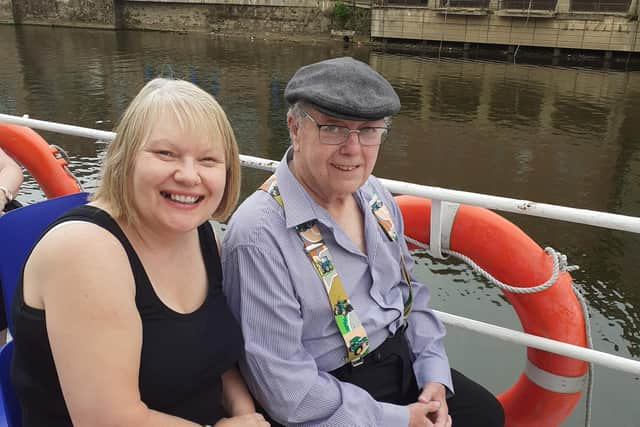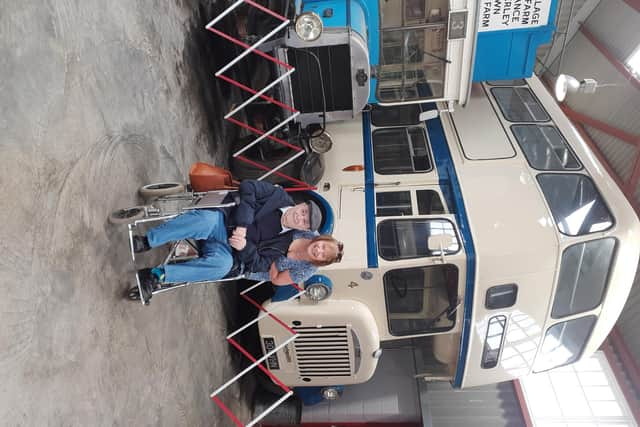Alzheimer’s Society support helps Debbie care for Paul
Debbie Johnson, aged 59, took it upon herself to care for Paul Richardson after he was diagnosed with dementia nine years ago, at the age of 71, even though they are not related.
Debbie said: “Paul is my late husband’s cousin and to be honest we didn’t see him that often. But one day, at a family funeral, I realised there was something wrong when he asked me ‘why isn’t John here?’. It was John who was being buried.
Advertisement
Hide AdAdvertisement
Hide Ad“I persuaded him to have a memory test and accompanied him on his appointment. That eventually led to a brain scan that revealed his diagnosis was alcohol related.


“Paul has been a bachelor all his life. He missed out on so much because he chose alcohol over everything else, but it was clear to me he needed support, so I chose to be there for him.
“It hasn’t been easy. It put a strain on my own relationship and, sadly, when my husband Alwyn died last year, I even found it hard to grieve for him as looking after Paul is so demanding.
“However, as challenging as it is, caring for someone is also very rewarding. Paul is like a frightened little boy sometimes, and just wants to be reassured he’s going to be OK. So, I’m here to support him in any way I can. Even though he is confused for much of the time, I still get glimpses of the old Paul – and the cheeky chappie he used to be.”
Advertisement
Hide AdAdvertisement
Hide AdDebbie, who gave up her job as a family support worker to care for Paul, says she is especially grateful for the support she has received from Alzheimer’s Society.


They have visited a Dementia Café run by the charity in York, as well as craft sessions and a Singing for the Brain group, which uses music to stimulate memories.
Debbie added: “I’ve received valuable advice from Alzheimer’s Society in relation to Paul’s dementia, such as how to cope with difficulties with diet, swallowing, toileting as well as the constant repetition that can be both exhausting and challenging.
“The charity has also provided me with support on legislation, including the Mental Capacity Act 2005 and the Care Act 2014. This was particularly helpful where disagreements occurred over Paul’s care needs and funding challenges.
Advertisement
Hide AdAdvertisement
Hide Ad“Without this valuable support and information, I really could not have managed or coped with the challenges Paul’s dementia brings. The charity’s online forum and support line were a huge help too, providing me with strategies to manage Paul’s behaviour.”
Alzheimer’s Society says its Dementia Support Services are a lifeline to families – and last year they were used more than 6.1 million times. The charity’s Dementia Support Line was used over 69,000 times in 2023. Meanwhile, pages relating to support on its website were visited more than four million times last year.
Among the top reasons for calling the Dementia Support line were for information about local services, which accounted for more than 51,000 calls, how to live well with dementia, with more than 23,000 calls, as well as more than 17,000 health-related calls. There we also over 5,800 calls relating to legal matters such as Lasting Power of Attorney.
Linda Haggie, Regional Manager for Alzheimer’s Society in Yorkshire, said: “It’s encouraging to hear how Debbie has benefitted from our support. She is doing a remarkable job caring for Paul.
Advertisement
Hide AdAdvertisement
Hide Ad“We want everyone affected by dementia to know that whoever you are, whatever you are going through, you can turn to Alzheimer’s Society for practical advice, emotional support and guidance for the best next step.
“We want to help people make the most of life with the condition, supporting them through some of the hardest and most frightening times.”
One in three people born today will develop dementia in their lifetime, and there are currently 900,000 people living with the condition in the UK, including more than 10,000 in North Yorkshire and an estimated 76,130 across Yorkshire and Humber.
Linda added: “We understand that getting a diagnosis can be daunting, but we believe it’s better to know – and nine out of 10 people with dementia told us they benefitted from receiving a diagnosis.”
For more information and advice, call Alzheimer’s Society’s Dementia Support Line on 0333 150 3456 or visit alzheimers.org.uk where you can also download a free symptom checklist.